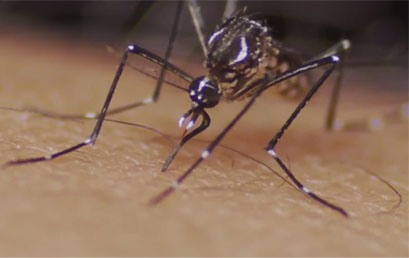November 20, 2020
The pre-eminent journal ‘Science’ published a report led by scientists from ZikaPLAN partner, the Institut Pasteur[1] entitled “Enhanced Zika virus susceptibility of globally invasive Aedes aegypti populations”. The paper provides new information about the emergence of the virus and offers an explanation for the lack of major Zika outbreaks in Africa hitherto.

Zika virus has caused millions of infections throughout the world and has been associated with congenital abnormalities and neurological disorders. Yet, how and why Zika virus has emerged in some regions but not others is not yet understood.
The domesticated form of Aedes aegypti, a mosquito native to Africa, has invaded most of the world’s tropical regions over the past four centuries. This subspecies specializes in biting humans and prefers to breed in artificial water containers, making it an efficient vector of viruses responsible for human diseases such as yellow fever and dengue.
In this paper, the researchers compared field-derived populations of Ae. aegypti from different regions of the globe. They show that in addition to their preference for humans, domesticated populations of Ae. aegypti outside Africa have a greater intrinsic ability to acquire and transmit Zika virus than their African relatives.
Thus, it is suggested that the recent evolution and global expansion of Ae. aegypti promoted arbovirus emergence not only through increased contact with humans but also as a result of enhanced vector susceptibility.
ZikaPLAN participant, Dr. Louis Lambrechts (Institut Pasteur / CNRS), who coordinated the study, commented:
"In this study, we identify mosquito genetics as a key factor in the risk of Zika outbreak. It is quite unfortunate that by developing a preference for humans, the Aedes aegypti mosquito also became more permissive to the virus."
1The researchers hail from the Evolutionary Genomics, Modeling, and Health unit (CNRS / Institut Pasteur), MIGEVEC (CNRS / IRD / University of Montpellier), the Mouse Genetics Laboratory (Institut Pasteur), the Pasteur Institutes of French Guiana, Guadeloupe, Cambodia and Dakar, the QIMR Berghofer Medical Research Institute (Australia), the Princeton University (USA), the Fundación Universidad del Norte (Colombia), the Centre Interdisciplinaire de Recherches Médicales de Franceville (Gabon), the Uganda Virus Research Institute (Uganda), the MRC-University of Glasgow Centre for Virus Research (UK), the Armed Forces Research Institute of Medical Sciences (Thailand), the Université Cheikh Anta Diop (Senegal), the Kenya Medical Research Institute (Kenya), the Centers for Disease Control and Prevention (USA), the Institut Louis Malardé (French Polynesia), and the Walter Reed Army Institute of Research (USA).